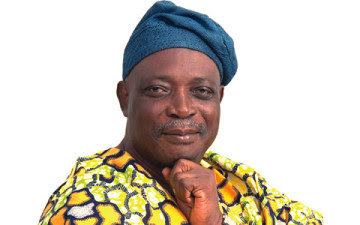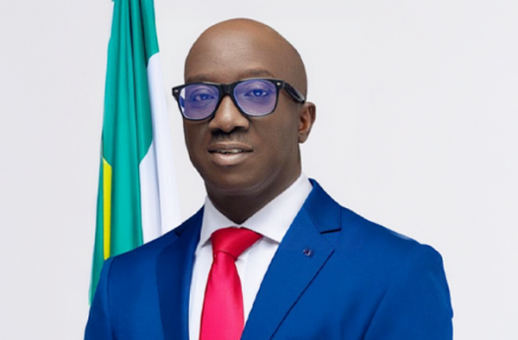News
What To Know About Rashidi Ladoja, The Next In To Become Olubadan

The Olubadan of Ibadanland, Oba Owolabi Olakulehin, on Monday joined his ancestors, paving the way for the emergence of former Oyo State Governor, Rashidi Adewolu Ladoja, as the next in line to the throne.
Contents
Background and Education
Early Political Involvement
Banking Career
Governorship of Oyo State
Political Crisis and Impeachment
Court Victory and Return to Office
EFCC Arrest
Subsequent Governorship Contests
Retreat from Politics
Acceptance of Ceremonial Beaded Crown
Tribune Online reports that the monarch, who ascended the throne in July 2024, died in the early hours of Monday, July 7, 2025, after spending only a year as Olubadan. His death came just two days after celebrating his 90th birthday.
To become Olubadan, a candidate must belong to one of the two high-ranking traditional chieftaincy lines — the Balogun (military) and Otun (civil) lines.
The late Oba Olakulehin belonged to the Balogun line and had waited 38 years after becoming Jagun Balogun before ascending the throne.
With his passing, the line of succession now shifts to the Otun line, where High Chief Rashidi Ladoja currently holds the highest position as Otun Olubadan. However, Ladoja’s ascension to the throne of Olubadan is subject to the approval of the Oyo State Governor, Seyi Makinde.
READ ALSO: JUST IN: Olubadan, Oba Olakulehin, Is Dead
In this article, Nigerian Tribune compiled important things to know about the man expected to become the next Olubadan.
Background and Education
Rashidi Adewolu Ladoja was born on September 24, 1944, in the Gambari area of Ibadan. He attended Ibadan Boys High School from 1958 to 1963 and Olivet Baptist High School between 1964 and 1965. He later studied chemical engineering at the University of Liège, Belgium, between 1966 and 1972.
Early Political Involvement
Ladoja was elected to the Nigerian Senate in 1993 during the short-lived Nigerian Third Republic, representing the United Nigeria Congress Party under the Abacha political transition.
Banking Career
In 2000, he rose to the position of director at Standard Trust Bank Limited before fully returning to politics.
Governorship of Oyo State
He was elected governor of Oyo State in April 2003 on the platform of the Peoples Democratic Party (PDP) and assumed office on May 29, 2003. His emergence was backed by the late Alhaji Lamidi Adedibu, a major PDP power broker in the state.
READ ALSO: JUST IN: Ladoja Withdraws Suit Against Olubadan-in-Council
Political Crisis and Impeachment
By August 2004, a power struggle between Ladoja and Adedibu over government appointments plunged the administration into crisis. This eventually led to Ladoja’s impeachment by Oyo State legislators on January 12, 2006. His deputy, Adebayo Alao-Akala, was sworn in as governor.
Court Victory and Return to Office
On November 1, 2006, the Court of Appeal declared the impeachment null and void, pending Supreme Court confirmation. The apex court upheld the verdict on November 11, 2006, and Ladoja officially resumed office on December 12, 2006.
EFCC Arrest
On August 28, 2008, the Economic and Financial Crimes Commission (EFCC) arrested Ladoja over allegations of non-remittance of N1.9 billion from the sale of government shares during his administration. He was briefly remanded in prison by the Federal High Court in Lagos on August 30, 2008, and granted bail of N100 million on September 5.
Subsequent Governorship Contests
He ran as the Accord Party candidate in the 2011 and 2015 Oyo State governorship elections but lost both times to Senator Abiola Ajimobi.
Retreat from Politics
Ladoja later joined the African Democratic Congress (ADC) and then the Zenith Labour Party (ZLP) in 2018 before stepping away from partisan politics to focus on traditional duties.
Acceptance of Ceremonial Beaded Crown
On August 12, 2024, the late Olubadan, Oba Olakulehin, presented the ceremonial beaded crown to High Chief Ladoja — a crown he had previously rejected during the administration of former Governor Abiola Ajimobi.
(TRIBUNE)
News
IYC Expresses Displeasure Over Okpebholo’s Neglect Of Edo Ijaw

Leadership of the Ijaw Youth Council (IYC), Western Zone, have expressed displeasure over what they described as the “persistent marginalisation of the Ijaw political class, traditional institutions and the ongoing abandonment of Ijaw communities,” by the Governor Monday Okpebholo-led Edo State government.
The IYC, in a statement jointly signed by Comrade Nicholas Igrama, Barr. Ebi Olowolayemo and Comrade Tare Magbei, Western Zone Chairman, Secretary and Information Officer respectively, lamented that despite the “massive support Ijaw people gave to Okpebholo across the five Ijaw clans in the state,” not a single appointment has been given to the Ijaw speaking people in the state.
The statement which was made available to newsmen in Benin on Tuesday, said that the “conspicuously absent of Ijaw man or woman in the State Executive Council,” gives credence to their claim.
READ ALSO:Tompolo, Otuaro: Call Your Subjects To Order, IYC Tells Itsekiri Monarch
The IYC, while stating that “we state this not out of bitterness or entitlement, but as a call for fairness, equity, and justice,” emphasized that “despite our enormous contributions to the state’s treasury through natural and human resources, Edo Ijaws remain conspicuously absent in the State Executive Council.”
The statement reads: “It is important to remind the Governor that the Ijaw nation mobilised massive support across the five Ijaw clans in Edo State to ensure his victory at the polls.
“Our voice was loud, our mobilisation was firm, and our votes counted significantly toward the success of this administration.
“Regrettably, one year after, this government has not deemed it necessary to appoint a single individual from the Ijaw extraction, nor has it addressed the glaring infrastructure deficit in our communities and also left our traditional issues unattented to.”
READ ALSO:IYC Urges Tinubu To Sack NCDMB Boss
The statement noted that “the Ijaw areas are the bedrock of the state’s oil wealth, the same wealth that qualifies Edo State as an oil-producing state and entitles it to the 13% derivation fund. Yet, there is no visible reflection of this revenue in our communities.”
“We state this not out of bitterness or entitlement, but as a call for fairness, equity, and justice.”
The IYC, therefore, urged the governor to “have a rethink so it doesn’t take to another form of agitation in the state where we contribute.”
News
EPL: Arteta Gives Update On Havertz, Saliba, Gabriel, Others

Arsenal manager, Mikel Arteta has provided the latest update on four of his players ahead of his side’s Premier League clash with Brentford on Wednesday.
The four players are Kai Havertz, William Saliba, Gabriel Magalhães and Leandro Trossard.
Arteta’s side will host Brentford in a Premier League tie at the Emirates Stadium on Wednesday night.
READ ALSO:EPL: Slot Reveals When Salah Will Leave For AFCON
Arsenal head to the game following a 1-1 draw with Chelsea in their last game over the weekend.
“Kai Havertz is still weeks away,” Arteta said at his pre-match press conference as quoted by Fabrizio Romano on Tuesday.
“We are all desperate to have him. I mean, it is a player that, personally, I love so much for what he brings to the team – his character, his personality. I see him suffer, being outside.
READ ALSO:EPL: He Has No Replacement – Alan Smith Names Arsenal’s Most Important Player
“Gabriel Magalhães is doing very well, but it will take weeks to see him back.
“For William Saliba and Leandro Trossard, hopefully it’s a matter of days.
“For Saliba, this one is very bizarre injury… but hopefully it will be a short time out.”
News
BREAKING: Tinubu Nominates New Defence Minister

President Bola Tinubu has nominated former Chief of Defence Staff, CDS, Gen. Christopher Gwabin Musa, rtd, as the new Minister of Defence.
In a letter to Senate President Godswill Akpabio, Tinubu disclosed Musa’s nomination as the successor to Alhaji Mohammed Badaru, who resigned on Monday.
Musa served as Chief of Defence Staff from 2023 until October 2025. He won the Colin Powell Award for Soldiering in 2012.
READ ALSO:BREAKING: Ex-CDS Musa meets Tinubu At Aso Villa
Born in Sokoto in 1967, Musa received his primary and secondary education there before attending the College of Advanced Studies in Zaria.
He graduated in 1986 and enrolled at the Nigerian Defence Academy the same year, earning a Bachelor of Science degree upon graduation in 1991.

 Metro5 days ago
Metro5 days agoJUST IN: One Dead As Ngige Escapes Assassination

 News3 days ago
News3 days ago(VIDEO) Obasanjo To Tinubu: Why Are We Negotiating With Bandits?

 Headline4 days ago
Headline4 days agoFULL LIST: US To Review Green Cards From 19 ‘Countries Of Concern’ After Washington Shooting

 News4 days ago
News4 days agoNaira Records First Depreciation Against US Dollar Across Official, Black FX Markets

 News2 days ago
News2 days agoInsecurity: What Sheikh Gumi Told Me After Visiting Bandits Hideouts — Obasanjo

 Politics3 days ago
Politics3 days agoTinubu Sends Ex-INEC Chair, Former Oyo First Lady, 30 Additional Ambassadorial Nominees To Senate

 Entertainment4 days ago
Entertainment4 days agoTems Reveals What She Loves Most About Wizkid

 News5 days ago
News5 days agoTinubu Constitutes Membership For US–Nigeria Security Working Group

 News4 days ago
News4 days agoWhy I Returned To Nigeria On Ivorian Jet — Jonathan

 News3 days ago
News3 days agoVIDEO: Jonathan Breaks Silence On Guinea-Bissau’s Military Takeover


























